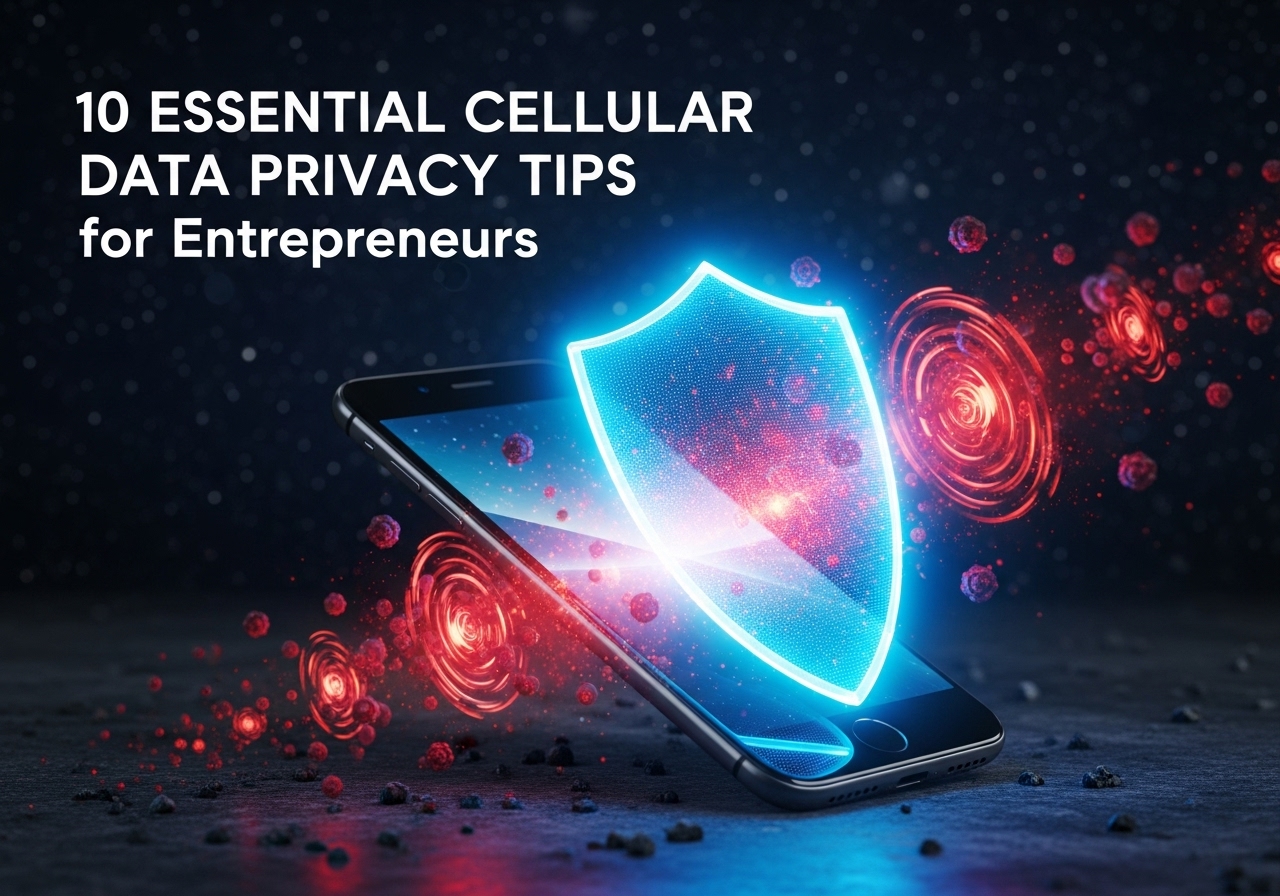Why Cellular Data Privacy Matters More Than Ever
Did you know that over 60% of business data breaches now originate from compromised mobile devices? For entrepreneurs, your smartphone is a lifeline—but it’s also a prime target for cybercriminals eager to exploit vulnerabilities and access sensitive company information. Consequently, if you’re running a business in 2025, ignoring cellular data privacy could be a costly mistake. As digital footprints grow, so do privacy risks. Hackers, data brokers, and even competitors are constantly searching for ways to intercept, steal, or misuse your data. With new privacy laws and sophisticated attack methods on the rise, protecting your cellular data isn’t just smart—it’s essential for your business’s survival.
Top Cellular Data Privacy Threats for Entrepreneurs
- SIM Swap Attacks: Cybercriminals trick mobile providers into transferring your number to a new SIM, giving them access to calls, texts, and authentication codes. This is a severe threat recognized by authorities like the FCC.
- Phishing & Smishing: Fraudulent emails and text messages can lure you into revealing passwords or installing malware.
- Unsecured Wi-Fi Networks: Public hotspots are breeding grounds for hackers to intercept data and compromise devices.
- Data Overexposure: Oversharing personal or business details on social media or unsecured apps can inadvertently leak sensitive information.
Actionable Cellular Data Privacy Tips for Entrepreneurs
1. Use Strong, Unique Passwords—and a Password Manager
Reusing passwords is a leading cause of account breaches. Therefore, you should create long, unique passphrases for every business account. Password managers can help you generate and store complex passwords securely, making it easier to maintain good hygiene across devices.
2. Enable Multi-Factor Authentication (MFA) Everywhere
Always activate MFA on your business email, banking, and cloud accounts. In addition, prefer app-based or hardware security keys over SMS-based authentication, as the latter is vulnerable to SIM swap attacks.
3. Protect Against SIM Swapping
- Contact your mobile provider and set up a unique PIN or password for your account.
- Use mobile carriers that offer enhanced privacy features—some now provide encrypted voicemail and real SIM swap protection.
- Never share your phone number more than necessary, especially on public forums or business directories.
4. Keep Your Devices and Apps Updated
Outdated software is an open invitation for hackers. For this reason, regularly update your mobile OS, business apps, and browsers. Enable automatic updates whenever possible to patch vulnerabilities quickly.
5. Avoid Public Wi-Fi for Sensitive Transactions
If you must work on the go, use your mobile data plan or a trusted VPN for secure internet connections. In fact, you should never access business banking, confidential documents, or cloud services over public Wi–Fi without protection.
6. Monitor Account Activity and Set Up Alerts
Routinely review activity logs on your business accounts. Also, set up instant alerts for logins, password changes, or large transactions. Early detection is your best defense against fraud.
7. Limit Data Sharing and Oversharing
Be mindful of what you share on social media and in apps. Avoid posting details that could answer security questions or expose business vulnerabilities. Furthermore, never input sensitive business data into AI tools or platforms you don’t control.
8. Leverage Advanced Privacy Tech
Consider privacy-focused mobile solutions that minimize data collection, encrypt your calls and messages, and offer advanced anti-tracking features. These technologies can significantly reduce your risk profile.
9. Collaborate Across Teams for Privacy Compliance
Work closely with your IT, legal, and marketing teams to ensure your privacy policies and practices are up-to-date with current regulations. Ultimately, privacy is a company-wide responsibility, not a solo act. CDM Suite can help you integrate these practices.
10. Educate Yourself and Your Team
Stay informed about the latest threats and best practices. In conclusion, conduct regular privacy and security training for all employees, because knowledge is a powerful defense.
Real-World Example: How a SIM Swap Nearly Cost a Startup Its Funding
In late 2024, a fintech startup’s founder received a text alert: their two-factor authentication code had just been used. Minutes later, the startup’s bank account was drained. Hackers had used publicly available information to impersonate the founder and convince the mobile carrier to transfer the SIM card. With access to SMS codes, they bypassed email and bank security. The breach could have been prevented with account PINs, app-based authentication, and stricter internal privacy policies.
Quick Checklist: Cellular Data Privacy for Entrepreneurs
- Change default passwords and use a password manager
- Enable MFA—prefer authenticator apps or security keys
- Set up a carrier PIN to prevent SIM swaps
- Update all devices and apps promptly
- Avoid public Wi-Fi for business; use VPN when necessary
- Monitor account activity and set up alerts
- Limit what you share online and in apps
- Invest in privacy-centric mobile technology
- Work with your team to ensure privacy compliance
- Stay educated on new threats and laws
The Bottom Line
For entrepreneurs, cellular data privacy is non-negotiable. The risks are real, but with the right strategies, you can protect your business, your customers, and your reputation from costly breaches. Ready to take your business security—and growth—to the next level? Find out EXACTLY what’s missing in your marketing strategy. Take our free 3-minute assessment and get a custom growth plan for your business today!



